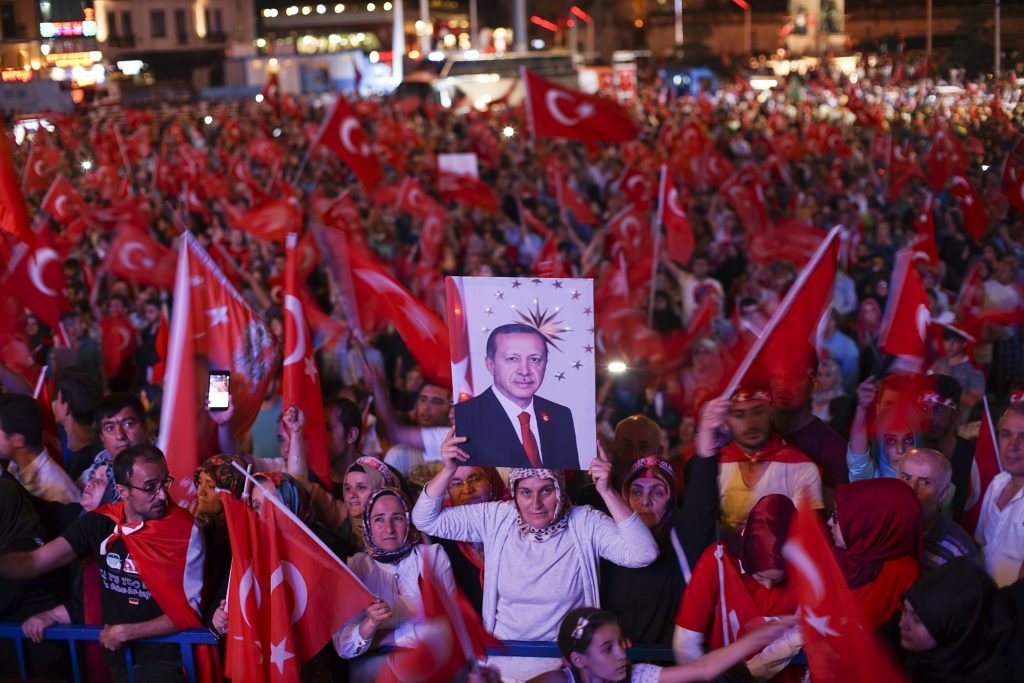President Recep Tayyip Erdogan and His Ruling AKP Have Declared Victory
ANKARA, Turkey (A.W.)—International election observers have sharply criticized Turkey’s historic referendum, which took place on April 16 and passed by a narrow margin. According to official results, 51.4% voted in favor of the proposed constitutional changes, which will secure Turkish President Recep Tayyip Erdogan’s increasing grip on power.

Observers from the Organization for Security and Cooperation in Europe (OSCE) reported on the day following the vote that Turkey’s constitutional referendum was contested on “an unlevel playing field.”
Turkey’s Prime Minister Binali Yildirim of the ruling Justice and Development Party (AKP) declared victory in the referendum, which will convert Turkey from a parliamentary to a strong president system of government.
The referendum, which consisted of 18 amendments to the country’s constitution, primarily deals with the powers of the executive and legislative branches. Most notably, the post of Prime Minister will be scrapped, as the president will appoint the Cabinet and will have a number of Vice-Presidents. Parliament will no longer oversee the Ministers, and the number of Members of Parliament will be increased from 550 to 600 and their minimum age lowered to 18.
Critics have condemned President Erdogan’s push for the constitutional changes as a way for the leader to increase his own power. With the new constitution, Erdogan can technically stay at his post until 2029.
The president will also no longer have to be neutral. Erdogan will now be able to maintain his affiliation to his political party.
Despite the technical aspects of the voting process being well administered, voters were not provided with impartial information on key aspects of what they were voting for, the joint mission of the OSCE’s Office for Democratic Institutions and Human Rights (ODIHR) and the Parliamentary Assembly of the Council of Europe (PACE) said in a statement.
“On referendum day there were no major problems, except in some regions, however we can only regret the absence of civil society observers in polling stations,” said Cezar Florin Preda, Head of the delegation from PACE. “In general, the referendum did not live up to Council of Europe standards. The legal framework was inadequate for the holding of a genuinely democratic process.”
“The referendum took place in a political environment in which fundamental freedoms essential to a genuinely democratic process were curtailed under the state of emergency, and the two sides did not have equal opportunities to make their case to the voters,” said Tana de Zulueta, Head of the ODIHR limited election observation mission. “Our monitoring showed the ‘Yes’ campaign dominated the media coverage and this, along with restrictions on the media, the arrests of journalists and the closure of media outlets, reduced voters’ access to a plurality of views.”
Opposition forces were also quick to condemn the outcome of the vote, and have announced that they will appeal to relevant bodies. Turkey’s main opposition party, the People’s Republican Party (CHP) has claimed that as many as 1.5 million “unsealed” ballots that did not bear the official voting stamp, were cast and tallied. The pro-Kurdish Peoples’ Democratic Party (HDP) has also contested the results.
The HDP, which has had two of its leaders imprisoned under Erdogan’s rule, said on April 16 that the referendum’s result would not be considered legitimate until their appeal was accepted. “Our co-chairs being jailed, the referendum being held under a state of emergency, and other oppressive measures cast a shadow and legitimacy problem over the vote,” HDP spokesman Osman Baydemir told reporters following the vote.
Austria’s Foreign Affairs Minister Sebastian Kurz called the result a “clear signal against the European Union,” while The European Commission urged Turkey to seek “the broadest possible consensus” in implementing changes pointing to “alleged irregularities” in the vote and said it was awaiting the assessment of international observers.
The vote has effectively divided Turkey. While supporters claim that the change will bring on a more stable and efficient government, opponents have said that the move is a dangerous step toward one-man rule.


Be the first to comment